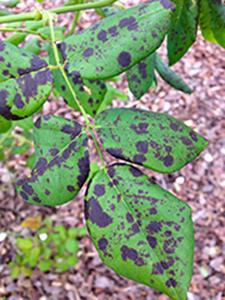Undergraduate Drew Zagala helping to keep roses beautiful by breeding in disease resistance
Often regarded as ancient symbols of beauty and love, roses have long been valued for their aesthetic qualities and natural allure. Drew Zagala is helping to preserve this beauty through research that creates roses resistant to unsightly diseases. As an undergraduate student majoring in Plant Science, Drew Zagala is integrating the knowledge he received from his plant breeding and plant pathology courses and applying it to a research project breeding roses that have resistance to one of the most prevalent rose diseases -- Black Spot of Rose.
Black Spot is a fungal pathogen (Diplocarpon rosae) that initially affects roses by causing dark lesions on leaves and eventually causes defoliation. “This reduces the photosynthetic capabilities of rose and after subsequent defoliations the plant is less likely to produce beautiful flowers, and if defoliation is so great the plant may die,” says Zagala.

In order to prevent this, Zagala is working with SBC members Stan Hokanson in the Department of Horticultural Science and Jim Bradeen in the Department of Plant Pathology, as well as UW River Falls collaborator (and University of Minnesota alumnus) David Zlesak to identify molecular markers associated with resistance to this disease. Using these markers breeders can create rose cultivars resistant to Black Spot. Since there are many different genetic variations (races) found within this pathogen, a goal of this research is to create a cultivar resistant to multiple races, providing a widespread form of disease resistance.
This research is a part of the USDA-NIFA-SCRI RosBREED program, which focuses on the genetic improvement of horticultural quality and disease resistance in crops within the rose family, including apple, peach, strawberry and other ornamentals. As a result of this, once the molecular markers for Black Spot resistance are available, they will be distributed to other plant breeders in North America. “Then any other breeder working with roses can integrate that Black Spot resistance into any roses they create,” says Zagala.
Not only will this help protect roses from disease, but in an effort to create more sustainable systems, Zagala says breeding resistance into these plants will allow growers to use fewer inputs when managing their roses. “Instead of relying on fungicides to protect plants, we’re integrating resistance to diseases within the plant. Essentially we’re creating roses that can take care of themselves.”